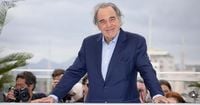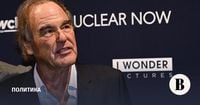In a notable development in cultural diplomacy, the Kremlin has indicated that a meeting between Russian President Vladimir Putin and acclaimed American director Oliver Stone may take place this week in Moscow. This potential encounter, which could occur during Stone's participation in the 'Knowledge. The Firsts' marathon, has stirred interest given the director's past interactions with the Russian leader.
Press Secretary Dmitry Peskov confirmed the possibility of the meeting, stating, "Perhaps. We hope so," while addressing reporters about the upcoming event. Stone, a three-time Oscar winner, is expected to deliver a speech at the marathon, which runs from April 28 to April 30, 2025.
Oliver Stone arrived in Moscow to participate in the forum, with his appearance scheduled for today, April 29, at 16:15. His talk, titled "Cinema as a Mirror of the Era: Reflection of Historical Events on the Screen," is anticipated to draw significant attention, especially among those interested in the intersection of film and historical narrative.
Stone's visit was initially announced last week but has been shrouded in a degree of secrecy, with no confirmed reports of his arrival at Vnukovo Airport or public outings in the city. The marathon is taking place at Poklonnaya Gora, a site known for its historical significance, and Russian television networks have prepared for live broadcasts of the event.
Throughout his career, Stone has tackled complex and often controversial subjects, earning acclaim for films such as 'Midnight Express,' for which he won his first Oscar for Best Adapted Screenplay, and 'Platoon,' which garnered him a second Oscar for Best Director. His body of work also includes notable documentaries that explore significant historical events, including the assassination of President John F. Kennedy and the Palestinian-Israeli conflict.
This meeting, if it occurs, could represent a further step in fostering cultural and public engagement between the United States and Russia during a time of strained geopolitical relations. Experts suggest that Stone's previous criticisms of Western policies and his interest in presenting a more nuanced view of Russia on the global stage could play a role in the dialogue.
Peskov also touched on the broader context of Russian-American relations, noting that there have been efforts to unblock bilateral dialogue, despite ongoing disagreements. He expressed optimism about the potential for progress in peacefully resolving international conflicts.
Stone's previous interactions with Putin, which occurred between 2015 and 2017, included approximately ten meetings that varied in format from formal interviews to more casual discussions. These sessions formed the foundation for his 2017 documentary, "The Putin Interviews," which offered an in-depth look at the Russian president's perspectives on various global issues.
As the world watches, the potential meeting between Stone and Putin could serve as a significant moment in cultural diplomacy, reflecting both the challenges and opportunities present in international relations today. With Stone's unique position as a filmmaker and commentator, this encounter may provide insights into the evolving narrative surrounding Russia in the global media landscape.
In a time marked by division and misunderstanding, such interactions may help bridge gaps and foster a more comprehensive understanding between nations. As the marathon unfolds, all eyes will be on the developments that emerge from this high-profile event, particularly the anticipated speech by Stone and the possibility of his meeting with the Russian leader.


